Bureaucracy in Social Theory: Weber, Critiques, and Application
VerifiedAdded on 2022/08/10
|26
|5849
|22
Essay
AI Summary
This essay delves into the concept of bureaucracy as a social theory, primarily focusing on Max Weber's contributions. It begins with a definition of bureaucracy, tracing its historical roots and political context, and highlighting Weber's ideal-typical forms of administration. The essay elaborates on the characteristics of bureaucratic systems, including hierarchical layers of authority, specialization, rules, impersonality, and the centrality of written documents. It presents the advantages and disadvantages of bureaucracy, particularly its connection to the 'iron cage' concept. Furthermore, the essay explores critiques of bureaucracy, including feminist and contemporary perspectives. The assignment fulfills the requirements of a social theory course, providing a comprehensive analysis of bureaucracy's theoretical underpinnings, historical context, and ongoing relevance.
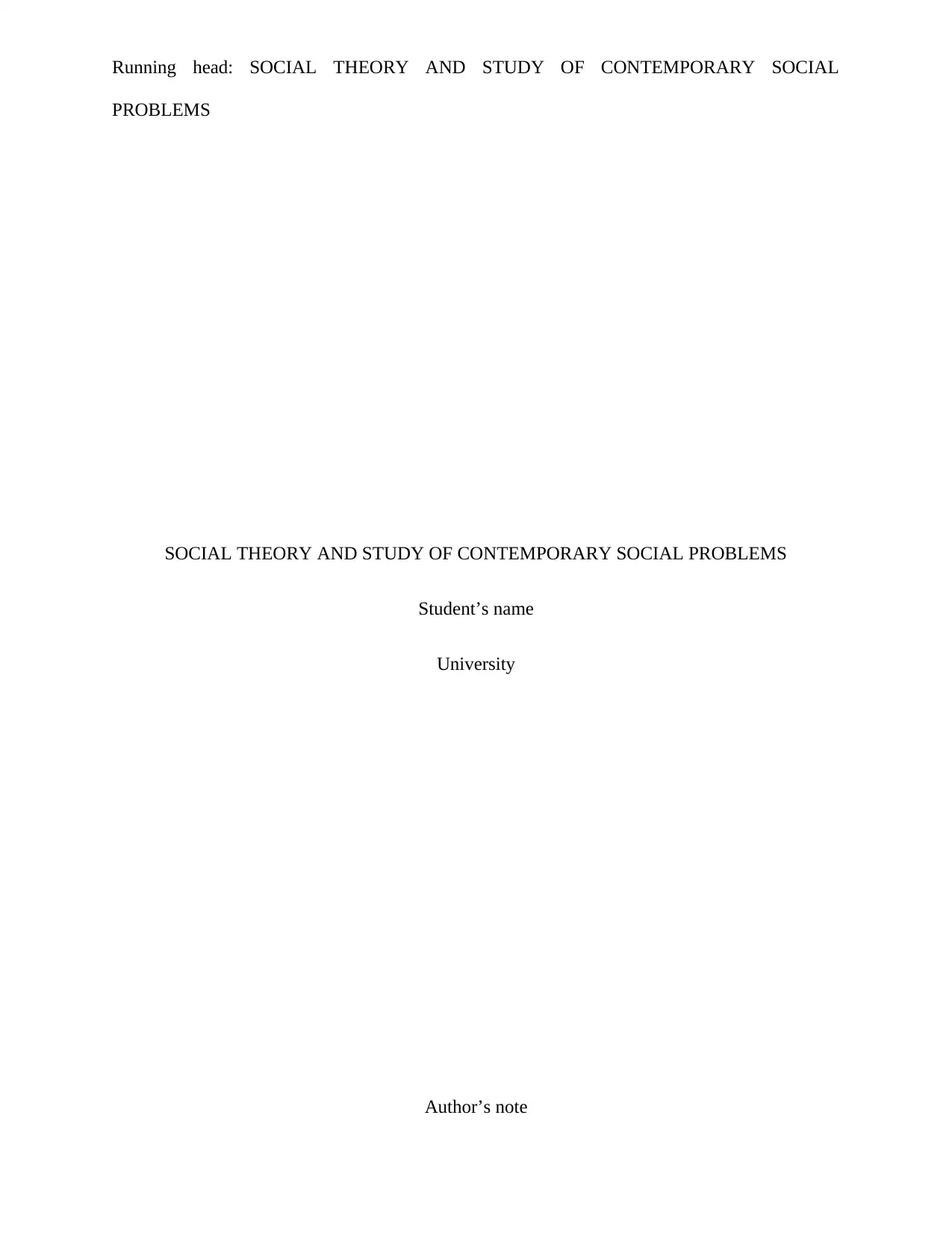
Running head: SOCIAL THEORY AND STUDY OF CONTEMPORARY SOCIAL
PROBLEMS
SOCIAL THEORY AND STUDY OF CONTEMPORARY SOCIAL PROBLEMS
Student’s name
University
Author’s note
PROBLEMS
SOCIAL THEORY AND STUDY OF CONTEMPORARY SOCIAL PROBLEMS
Student’s name
University
Author’s note
Paraphrase This Document
Need a fresh take? Get an instant paraphrase of this document with our AI Paraphraser
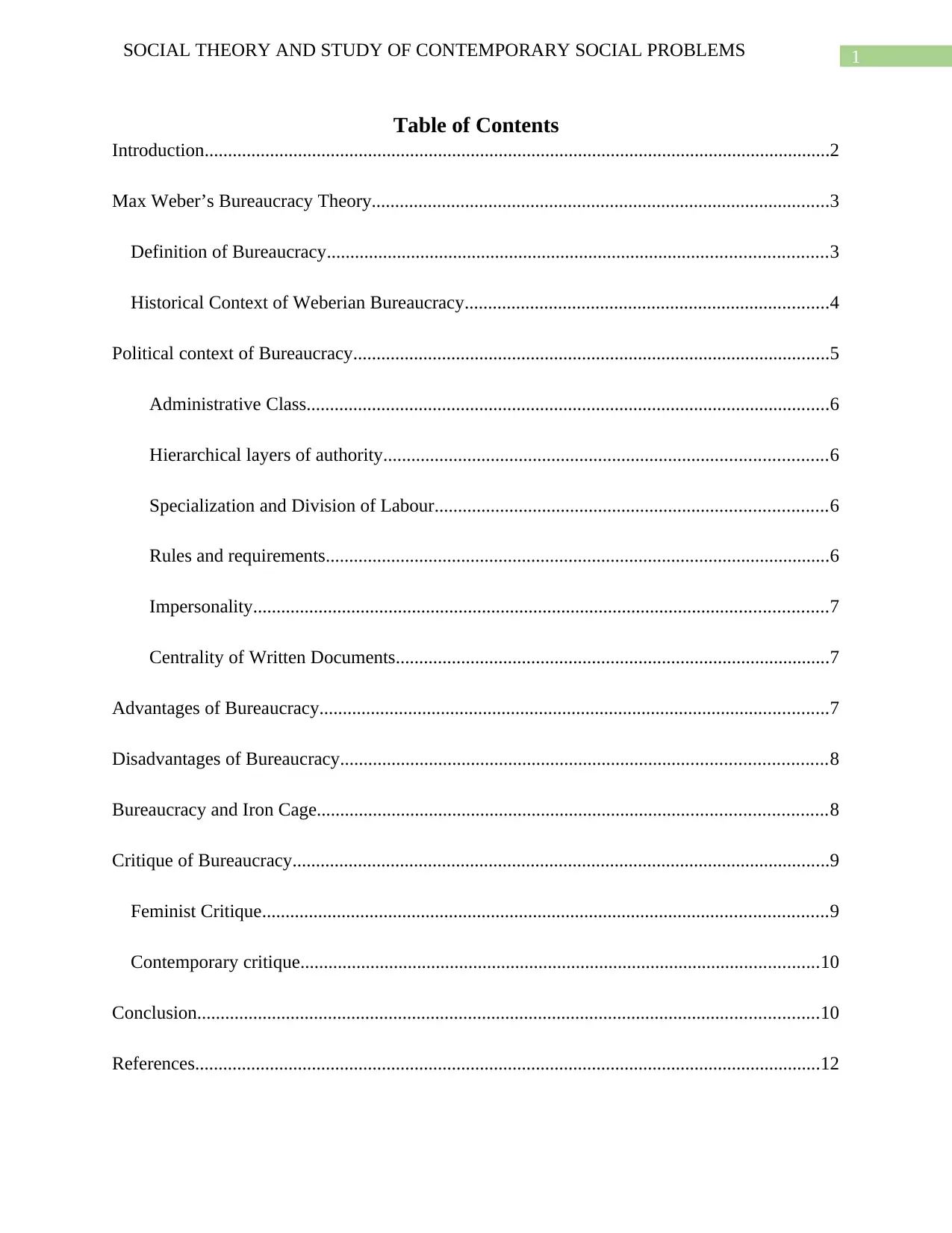
1SOCIAL THEORY AND STUDY OF CONTEMPORARY SOCIAL PROBLEMS
Table of Contents
Introduction......................................................................................................................................2
Max Weber’s Bureaucracy Theory..................................................................................................3
Definition of Bureaucracy...........................................................................................................3
Historical Context of Weberian Bureaucracy..............................................................................4
Political context of Bureaucracy......................................................................................................5
Administrative Class................................................................................................................6
Hierarchical layers of authority...............................................................................................6
Specialization and Division of Labour....................................................................................6
Rules and requirements............................................................................................................6
Impersonality...........................................................................................................................7
Centrality of Written Documents.............................................................................................7
Advantages of Bureaucracy.............................................................................................................7
Disadvantages of Bureaucracy........................................................................................................8
Bureaucracy and Iron Cage.............................................................................................................8
Critique of Bureaucracy...................................................................................................................9
Feminist Critique.........................................................................................................................9
Contemporary critique...............................................................................................................10
Conclusion.....................................................................................................................................10
References......................................................................................................................................12
Table of Contents
Introduction......................................................................................................................................2
Max Weber’s Bureaucracy Theory..................................................................................................3
Definition of Bureaucracy...........................................................................................................3
Historical Context of Weberian Bureaucracy..............................................................................4
Political context of Bureaucracy......................................................................................................5
Administrative Class................................................................................................................6
Hierarchical layers of authority...............................................................................................6
Specialization and Division of Labour....................................................................................6
Rules and requirements............................................................................................................6
Impersonality...........................................................................................................................7
Centrality of Written Documents.............................................................................................7
Advantages of Bureaucracy.............................................................................................................7
Disadvantages of Bureaucracy........................................................................................................8
Bureaucracy and Iron Cage.............................................................................................................8
Critique of Bureaucracy...................................................................................................................9
Feminist Critique.........................................................................................................................9
Contemporary critique...............................................................................................................10
Conclusion.....................................................................................................................................10
References......................................................................................................................................12
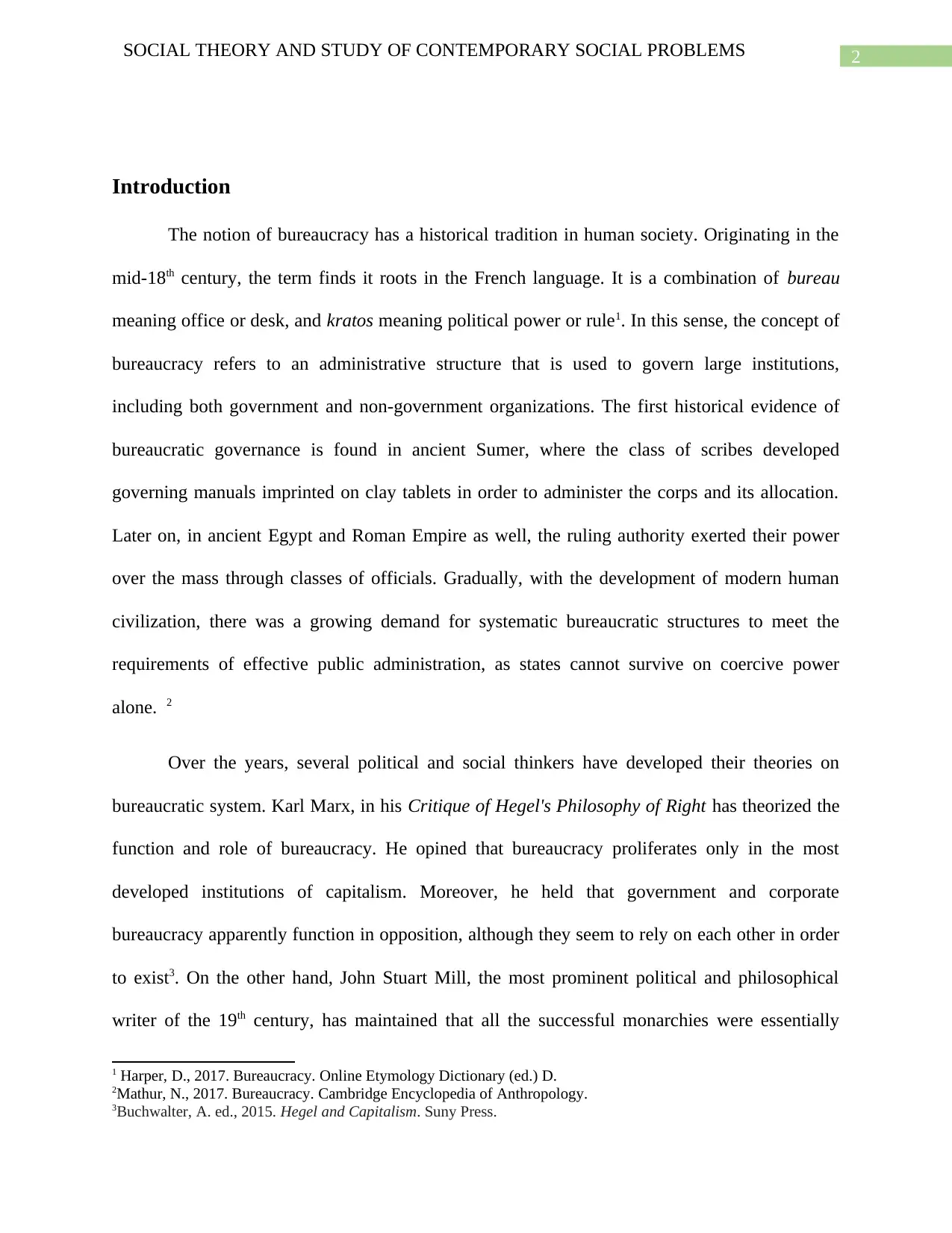
2SOCIAL THEORY AND STUDY OF CONTEMPORARY SOCIAL PROBLEMS
Introduction
The notion of bureaucracy has a historical tradition in human society. Originating in the
mid-18th century, the term finds it roots in the French language. It is a combination of bureau
meaning office or desk, and kratos meaning political power or rule1. In this sense, the concept of
bureaucracy refers to an administrative structure that is used to govern large institutions,
including both government and non-government organizations. The first historical evidence of
bureaucratic governance is found in ancient Sumer, where the class of scribes developed
governing manuals imprinted on clay tablets in order to administer the corps and its allocation.
Later on, in ancient Egypt and Roman Empire as well, the ruling authority exerted their power
over the mass through classes of officials. Gradually, with the development of modern human
civilization, there was a growing demand for systematic bureaucratic structures to meet the
requirements of effective public administration, as states cannot survive on coercive power
alone. 2
Over the years, several political and social thinkers have developed their theories on
bureaucratic system. Karl Marx, in his Critique of Hegel's Philosophy of Right has theorized the
function and role of bureaucracy. He opined that bureaucracy proliferates only in the most
developed institutions of capitalism. Moreover, he held that government and corporate
bureaucracy apparently function in opposition, although they seem to rely on each other in order
to exist3. On the other hand, John Stuart Mill, the most prominent political and philosophical
writer of the 19th century, has maintained that all the successful monarchies were essentially
1 Harper, D., 2017. Bureaucracy. Online Etymology Dictionary (ed.) D.
2Mathur, N., 2017. Bureaucracy. Cambridge Encyclopedia of Anthropology.
3Buchwalter, A. ed., 2015. Hegel and Capitalism. Suny Press.
Introduction
The notion of bureaucracy has a historical tradition in human society. Originating in the
mid-18th century, the term finds it roots in the French language. It is a combination of bureau
meaning office or desk, and kratos meaning political power or rule1. In this sense, the concept of
bureaucracy refers to an administrative structure that is used to govern large institutions,
including both government and non-government organizations. The first historical evidence of
bureaucratic governance is found in ancient Sumer, where the class of scribes developed
governing manuals imprinted on clay tablets in order to administer the corps and its allocation.
Later on, in ancient Egypt and Roman Empire as well, the ruling authority exerted their power
over the mass through classes of officials. Gradually, with the development of modern human
civilization, there was a growing demand for systematic bureaucratic structures to meet the
requirements of effective public administration, as states cannot survive on coercive power
alone. 2
Over the years, several political and social thinkers have developed their theories on
bureaucratic system. Karl Marx, in his Critique of Hegel's Philosophy of Right has theorized the
function and role of bureaucracy. He opined that bureaucracy proliferates only in the most
developed institutions of capitalism. Moreover, he held that government and corporate
bureaucracy apparently function in opposition, although they seem to rely on each other in order
to exist3. On the other hand, John Stuart Mill, the most prominent political and philosophical
writer of the 19th century, has maintained that all the successful monarchies were essentially
1 Harper, D., 2017. Bureaucracy. Online Etymology Dictionary (ed.) D.
2Mathur, N., 2017. Bureaucracy. Cambridge Encyclopedia of Anthropology.
3Buchwalter, A. ed., 2015. Hegel and Capitalism. Suny Press.
⊘ This is a preview!⊘
Do you want full access?
Subscribe today to unlock all pages.

Trusted by 1+ million students worldwide
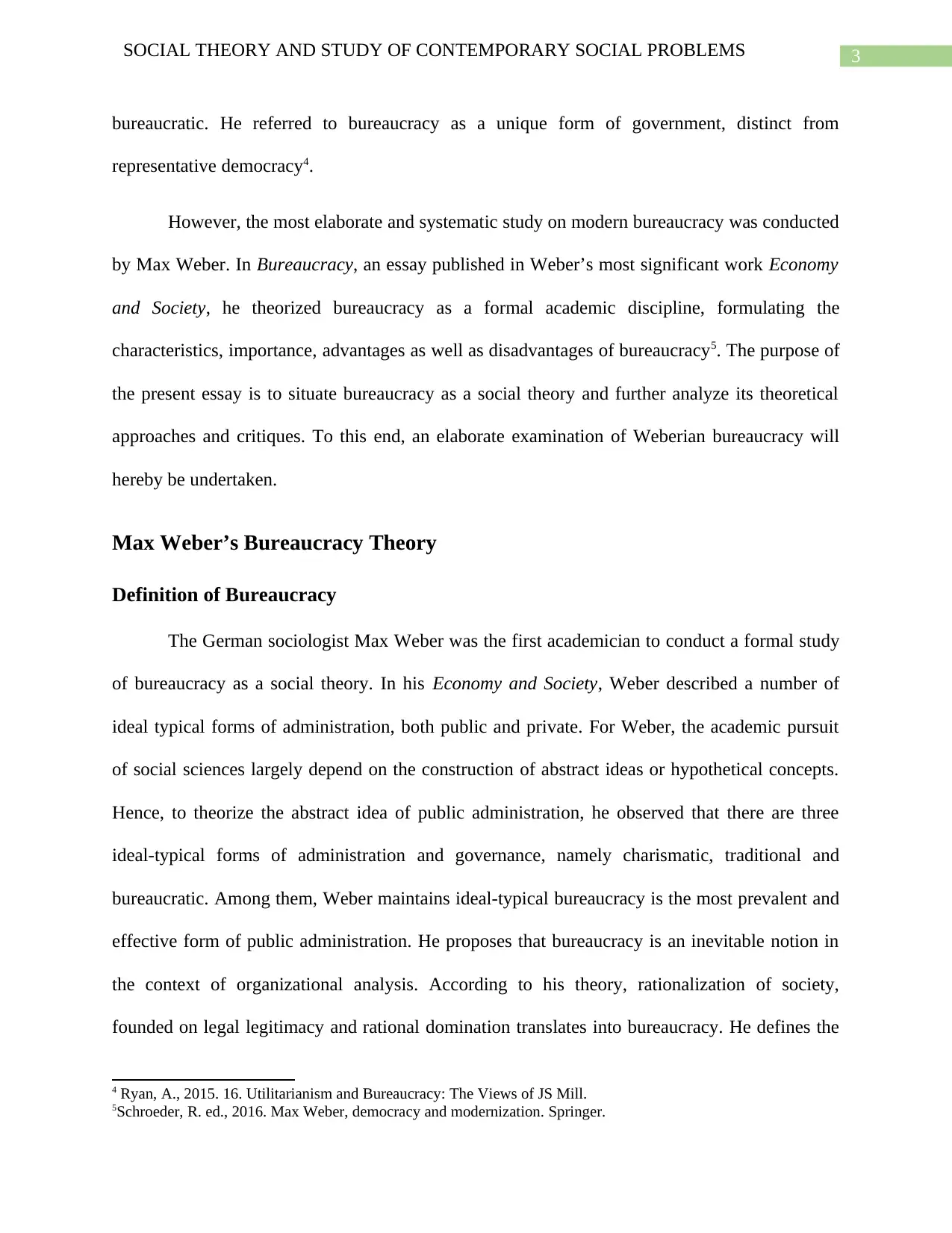
3SOCIAL THEORY AND STUDY OF CONTEMPORARY SOCIAL PROBLEMS
bureaucratic. He referred to bureaucracy as a unique form of government, distinct from
representative democracy4.
However, the most elaborate and systematic study on modern bureaucracy was conducted
by Max Weber. In Bureaucracy, an essay published in Weber’s most significant work Economy
and Society, he theorized bureaucracy as a formal academic discipline, formulating the
characteristics, importance, advantages as well as disadvantages of bureaucracy5. The purpose of
the present essay is to situate bureaucracy as a social theory and further analyze its theoretical
approaches and critiques. To this end, an elaborate examination of Weberian bureaucracy will
hereby be undertaken.
Max Weber’s Bureaucracy Theory
Definition of Bureaucracy
The German sociologist Max Weber was the first academician to conduct a formal study
of bureaucracy as a social theory. In his Economy and Society, Weber described a number of
ideal typical forms of administration, both public and private. For Weber, the academic pursuit
of social sciences largely depend on the construction of abstract ideas or hypothetical concepts.
Hence, to theorize the abstract idea of public administration, he observed that there are three
ideal-typical forms of administration and governance, namely charismatic, traditional and
bureaucratic. Among them, Weber maintains ideal-typical bureaucracy is the most prevalent and
effective form of public administration. He proposes that bureaucracy is an inevitable notion in
the context of organizational analysis. According to his theory, rationalization of society,
founded on legal legitimacy and rational domination translates into bureaucracy. He defines the
4 Ryan, A., 2015. 16. Utilitarianism and Bureaucracy: The Views of JS Mill.
5Schroeder, R. ed., 2016. Max Weber, democracy and modernization. Springer.
bureaucratic. He referred to bureaucracy as a unique form of government, distinct from
representative democracy4.
However, the most elaborate and systematic study on modern bureaucracy was conducted
by Max Weber. In Bureaucracy, an essay published in Weber’s most significant work Economy
and Society, he theorized bureaucracy as a formal academic discipline, formulating the
characteristics, importance, advantages as well as disadvantages of bureaucracy5. The purpose of
the present essay is to situate bureaucracy as a social theory and further analyze its theoretical
approaches and critiques. To this end, an elaborate examination of Weberian bureaucracy will
hereby be undertaken.
Max Weber’s Bureaucracy Theory
Definition of Bureaucracy
The German sociologist Max Weber was the first academician to conduct a formal study
of bureaucracy as a social theory. In his Economy and Society, Weber described a number of
ideal typical forms of administration, both public and private. For Weber, the academic pursuit
of social sciences largely depend on the construction of abstract ideas or hypothetical concepts.
Hence, to theorize the abstract idea of public administration, he observed that there are three
ideal-typical forms of administration and governance, namely charismatic, traditional and
bureaucratic. Among them, Weber maintains ideal-typical bureaucracy is the most prevalent and
effective form of public administration. He proposes that bureaucracy is an inevitable notion in
the context of organizational analysis. According to his theory, rationalization of society,
founded on legal legitimacy and rational domination translates into bureaucracy. He defines the
4 Ryan, A., 2015. 16. Utilitarianism and Bureaucracy: The Views of JS Mill.
5Schroeder, R. ed., 2016. Max Weber, democracy and modernization. Springer.
Paraphrase This Document
Need a fresh take? Get an instant paraphrase of this document with our AI Paraphraser
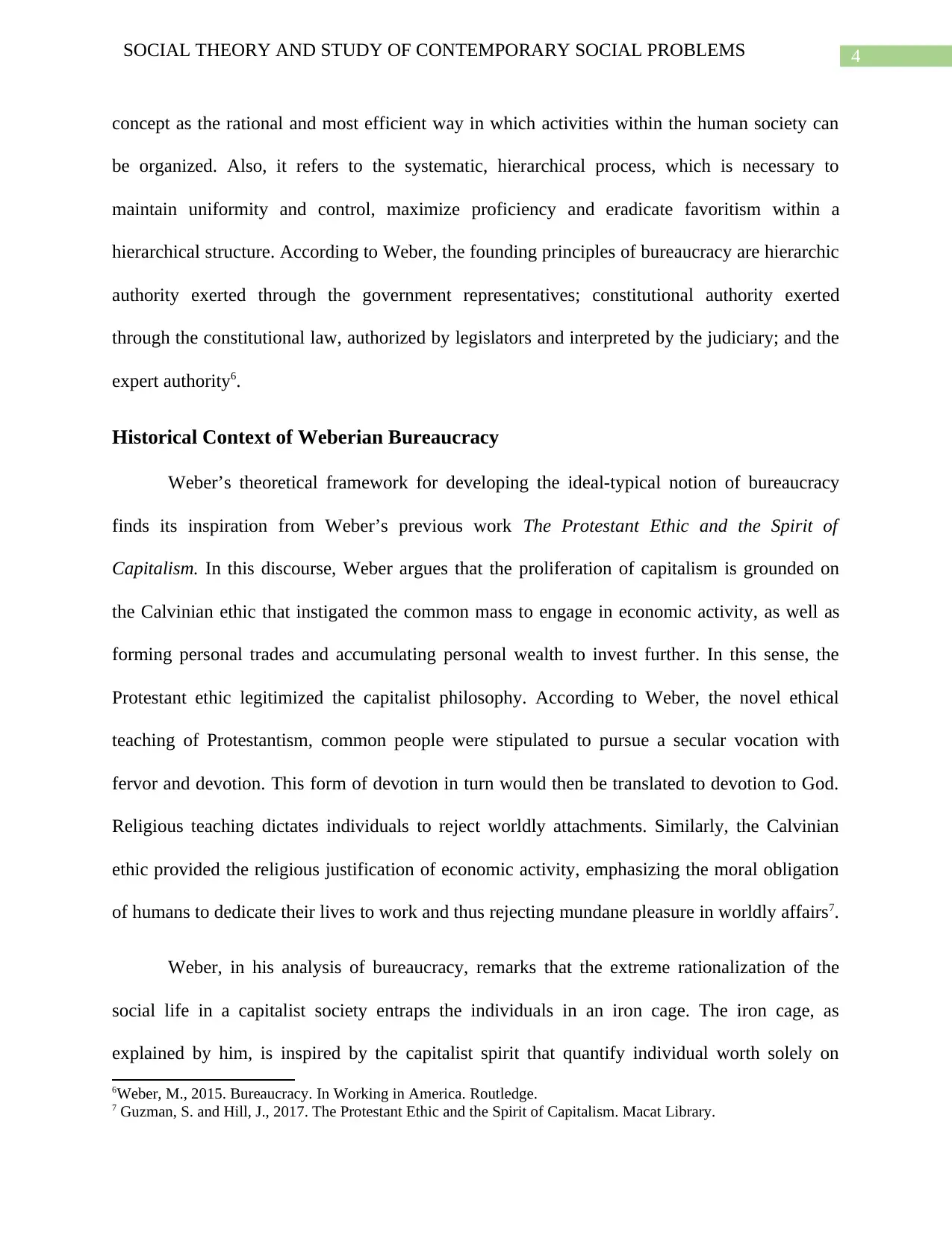
4SOCIAL THEORY AND STUDY OF CONTEMPORARY SOCIAL PROBLEMS
concept as the rational and most efficient way in which activities within the human society can
be organized. Also, it refers to the systematic, hierarchical process, which is necessary to
maintain uniformity and control, maximize proficiency and eradicate favoritism within a
hierarchical structure. According to Weber, the founding principles of bureaucracy are hierarchic
authority exerted through the government representatives; constitutional authority exerted
through the constitutional law, authorized by legislators and interpreted by the judiciary; and the
expert authority6.
Historical Context of Weberian Bureaucracy
Weber’s theoretical framework for developing the ideal-typical notion of bureaucracy
finds its inspiration from Weber’s previous work The Protestant Ethic and the Spirit of
Capitalism. In this discourse, Weber argues that the proliferation of capitalism is grounded on
the Calvinian ethic that instigated the common mass to engage in economic activity, as well as
forming personal trades and accumulating personal wealth to invest further. In this sense, the
Protestant ethic legitimized the capitalist philosophy. According to Weber, the novel ethical
teaching of Protestantism, common people were stipulated to pursue a secular vocation with
fervor and devotion. This form of devotion in turn would then be translated to devotion to God.
Religious teaching dictates individuals to reject worldly attachments. Similarly, the Calvinian
ethic provided the religious justification of economic activity, emphasizing the moral obligation
of humans to dedicate their lives to work and thus rejecting mundane pleasure in worldly affairs7.
Weber, in his analysis of bureaucracy, remarks that the extreme rationalization of the
social life in a capitalist society entraps the individuals in an iron cage. The iron cage, as
explained by him, is inspired by the capitalist spirit that quantify individual worth solely on
6Weber, M., 2015. Bureaucracy. In Working in America. Routledge.
7 Guzman, S. and Hill, J., 2017. The Protestant Ethic and the Spirit of Capitalism. Macat Library.
concept as the rational and most efficient way in which activities within the human society can
be organized. Also, it refers to the systematic, hierarchical process, which is necessary to
maintain uniformity and control, maximize proficiency and eradicate favoritism within a
hierarchical structure. According to Weber, the founding principles of bureaucracy are hierarchic
authority exerted through the government representatives; constitutional authority exerted
through the constitutional law, authorized by legislators and interpreted by the judiciary; and the
expert authority6.
Historical Context of Weberian Bureaucracy
Weber’s theoretical framework for developing the ideal-typical notion of bureaucracy
finds its inspiration from Weber’s previous work The Protestant Ethic and the Spirit of
Capitalism. In this discourse, Weber argues that the proliferation of capitalism is grounded on
the Calvinian ethic that instigated the common mass to engage in economic activity, as well as
forming personal trades and accumulating personal wealth to invest further. In this sense, the
Protestant ethic legitimized the capitalist philosophy. According to Weber, the novel ethical
teaching of Protestantism, common people were stipulated to pursue a secular vocation with
fervor and devotion. This form of devotion in turn would then be translated to devotion to God.
Religious teaching dictates individuals to reject worldly attachments. Similarly, the Calvinian
ethic provided the religious justification of economic activity, emphasizing the moral obligation
of humans to dedicate their lives to work and thus rejecting mundane pleasure in worldly affairs7.
Weber, in his analysis of bureaucracy, remarks that the extreme rationalization of the
social life in a capitalist society entraps the individuals in an iron cage. The iron cage, as
explained by him, is inspired by the capitalist spirit that quantify individual worth solely on
6Weber, M., 2015. Bureaucracy. In Working in America. Routledge.
7 Guzman, S. and Hill, J., 2017. The Protestant Ethic and the Spirit of Capitalism. Macat Library.
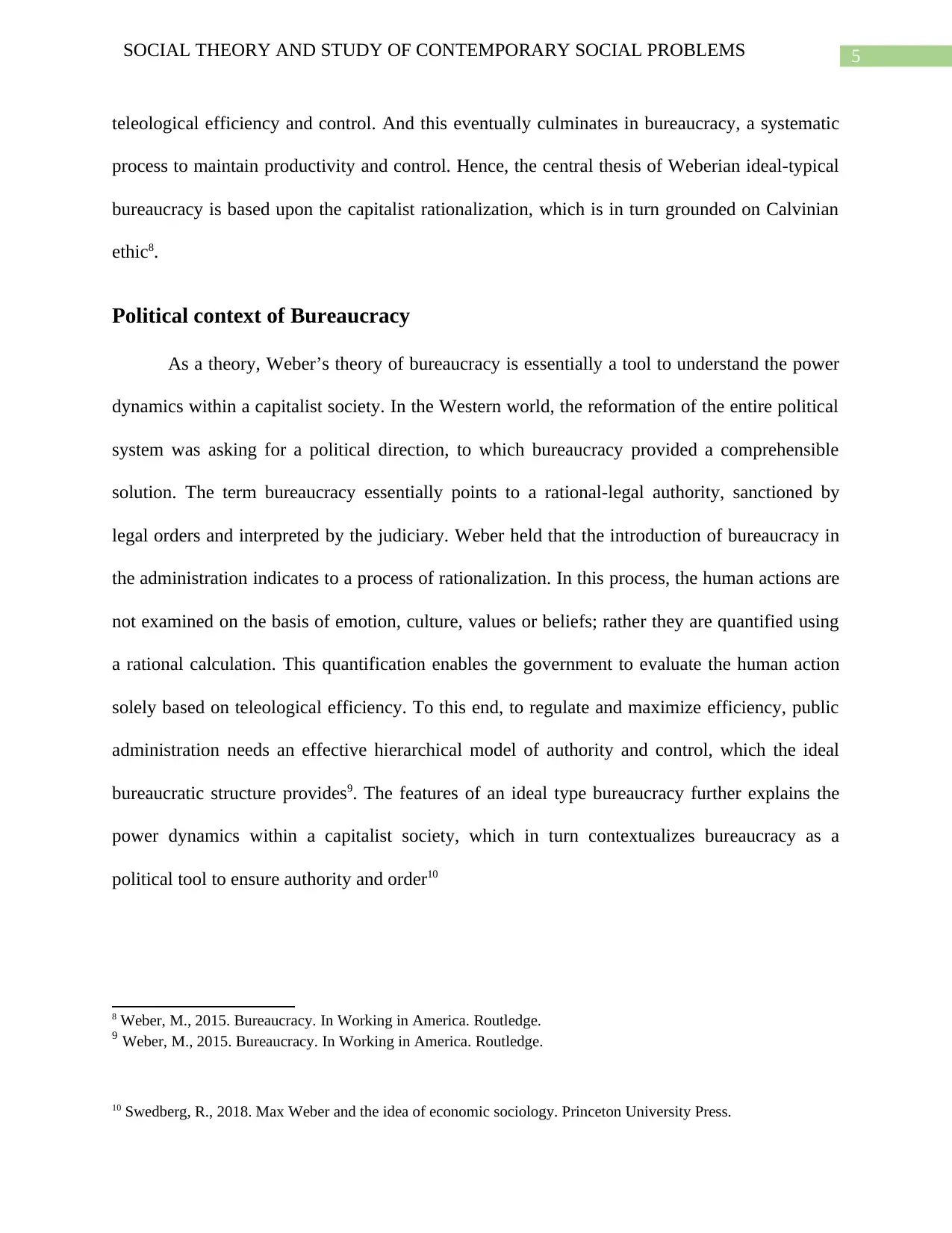
5SOCIAL THEORY AND STUDY OF CONTEMPORARY SOCIAL PROBLEMS
teleological efficiency and control. And this eventually culminates in bureaucracy, a systematic
process to maintain productivity and control. Hence, the central thesis of Weberian ideal-typical
bureaucracy is based upon the capitalist rationalization, which is in turn grounded on Calvinian
ethic8.
Political context of Bureaucracy
As a theory, Weber’s theory of bureaucracy is essentially a tool to understand the power
dynamics within a capitalist society. In the Western world, the reformation of the entire political
system was asking for a political direction, to which bureaucracy provided a comprehensible
solution. The term bureaucracy essentially points to a rational-legal authority, sanctioned by
legal orders and interpreted by the judiciary. Weber held that the introduction of bureaucracy in
the administration indicates to a process of rationalization. In this process, the human actions are
not examined on the basis of emotion, culture, values or beliefs; rather they are quantified using
a rational calculation. This quantification enables the government to evaluate the human action
solely based on teleological efficiency. To this end, to regulate and maximize efficiency, public
administration needs an effective hierarchical model of authority and control, which the ideal
bureaucratic structure provides9. The features of an ideal type bureaucracy further explains the
power dynamics within a capitalist society, which in turn contextualizes bureaucracy as a
political tool to ensure authority and order10
8 Weber, M., 2015. Bureaucracy. In Working in America. Routledge.
9 Weber, M., 2015. Bureaucracy. In Working in America. Routledge.
10 Swedberg, R., 2018. Max Weber and the idea of economic sociology. Princeton University Press.
teleological efficiency and control. And this eventually culminates in bureaucracy, a systematic
process to maintain productivity and control. Hence, the central thesis of Weberian ideal-typical
bureaucracy is based upon the capitalist rationalization, which is in turn grounded on Calvinian
ethic8.
Political context of Bureaucracy
As a theory, Weber’s theory of bureaucracy is essentially a tool to understand the power
dynamics within a capitalist society. In the Western world, the reformation of the entire political
system was asking for a political direction, to which bureaucracy provided a comprehensible
solution. The term bureaucracy essentially points to a rational-legal authority, sanctioned by
legal orders and interpreted by the judiciary. Weber held that the introduction of bureaucracy in
the administration indicates to a process of rationalization. In this process, the human actions are
not examined on the basis of emotion, culture, values or beliefs; rather they are quantified using
a rational calculation. This quantification enables the government to evaluate the human action
solely based on teleological efficiency. To this end, to regulate and maximize efficiency, public
administration needs an effective hierarchical model of authority and control, which the ideal
bureaucratic structure provides9. The features of an ideal type bureaucracy further explains the
power dynamics within a capitalist society, which in turn contextualizes bureaucracy as a
political tool to ensure authority and order10
8 Weber, M., 2015. Bureaucracy. In Working in America. Routledge.
9 Weber, M., 2015. Bureaucracy. In Working in America. Routledge.
10 Swedberg, R., 2018. Max Weber and the idea of economic sociology. Princeton University Press.
⊘ This is a preview!⊘
Do you want full access?
Subscribe today to unlock all pages.

Trusted by 1+ million students worldwide
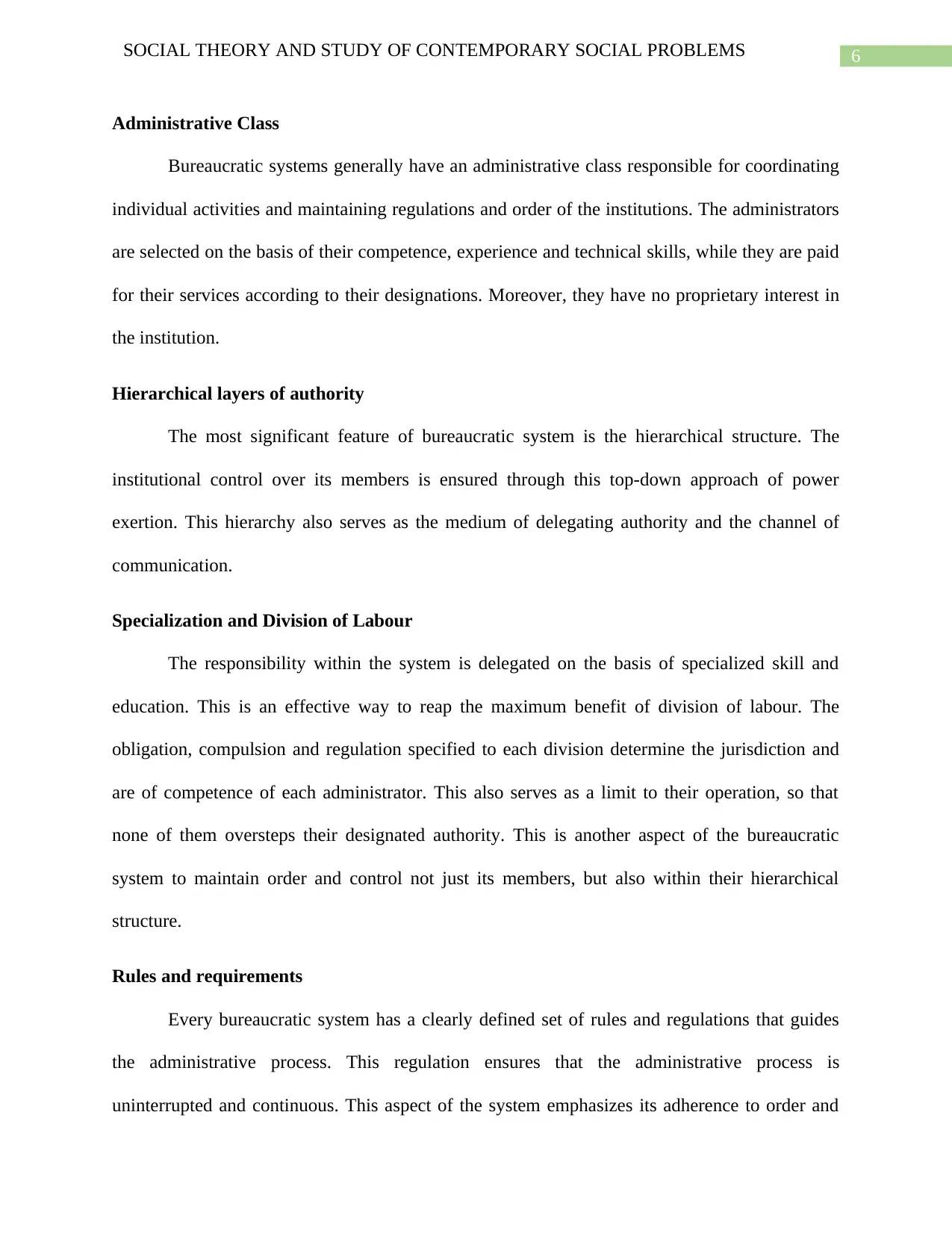
6SOCIAL THEORY AND STUDY OF CONTEMPORARY SOCIAL PROBLEMS
Administrative Class
Bureaucratic systems generally have an administrative class responsible for coordinating
individual activities and maintaining regulations and order of the institutions. The administrators
are selected on the basis of their competence, experience and technical skills, while they are paid
for their services according to their designations. Moreover, they have no proprietary interest in
the institution.
Hierarchical layers of authority
The most significant feature of bureaucratic system is the hierarchical structure. The
institutional control over its members is ensured through this top-down approach of power
exertion. This hierarchy also serves as the medium of delegating authority and the channel of
communication.
Specialization and Division of Labour
The responsibility within the system is delegated on the basis of specialized skill and
education. This is an effective way to reap the maximum benefit of division of labour. The
obligation, compulsion and regulation specified to each division determine the jurisdiction and
are of competence of each administrator. This also serves as a limit to their operation, so that
none of them oversteps their designated authority. This is another aspect of the bureaucratic
system to maintain order and control not just its members, but also within their hierarchical
structure.
Rules and requirements
Every bureaucratic system has a clearly defined set of rules and regulations that guides
the administrative process. This regulation ensures that the administrative process is
uninterrupted and continuous. This aspect of the system emphasizes its adherence to order and
Administrative Class
Bureaucratic systems generally have an administrative class responsible for coordinating
individual activities and maintaining regulations and order of the institutions. The administrators
are selected on the basis of their competence, experience and technical skills, while they are paid
for their services according to their designations. Moreover, they have no proprietary interest in
the institution.
Hierarchical layers of authority
The most significant feature of bureaucratic system is the hierarchical structure. The
institutional control over its members is ensured through this top-down approach of power
exertion. This hierarchy also serves as the medium of delegating authority and the channel of
communication.
Specialization and Division of Labour
The responsibility within the system is delegated on the basis of specialized skill and
education. This is an effective way to reap the maximum benefit of division of labour. The
obligation, compulsion and regulation specified to each division determine the jurisdiction and
are of competence of each administrator. This also serves as a limit to their operation, so that
none of them oversteps their designated authority. This is another aspect of the bureaucratic
system to maintain order and control not just its members, but also within their hierarchical
structure.
Rules and requirements
Every bureaucratic system has a clearly defined set of rules and regulations that guides
the administrative process. This regulation ensures that the administrative process is
uninterrupted and continuous. This aspect of the system emphasizes its adherence to order and
Paraphrase This Document
Need a fresh take? Get an instant paraphrase of this document with our AI Paraphraser
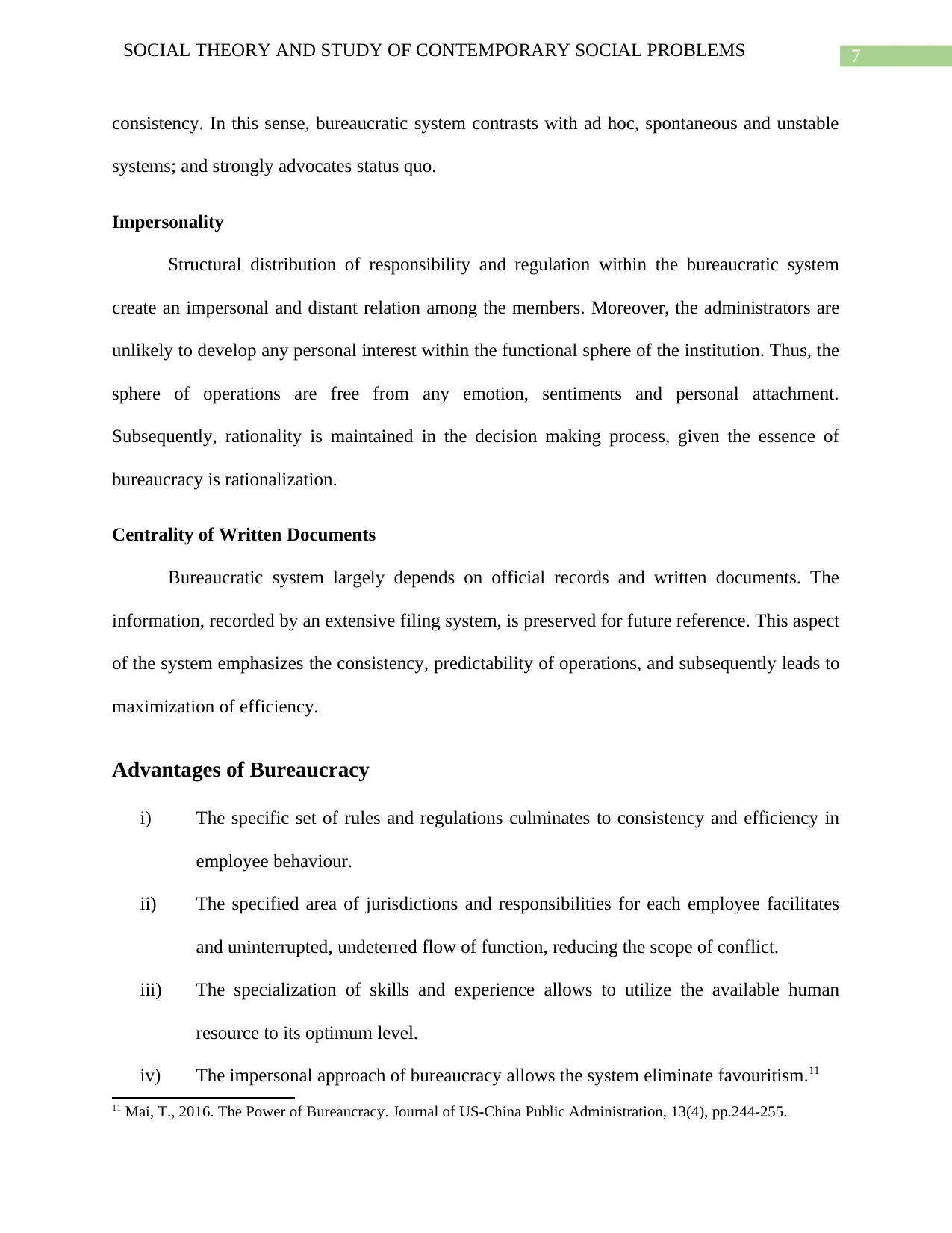
7SOCIAL THEORY AND STUDY OF CONTEMPORARY SOCIAL PROBLEMS
consistency. In this sense, bureaucratic system contrasts with ad hoc, spontaneous and unstable
systems; and strongly advocates status quo.
Impersonality
Structural distribution of responsibility and regulation within the bureaucratic system
create an impersonal and distant relation among the members. Moreover, the administrators are
unlikely to develop any personal interest within the functional sphere of the institution. Thus, the
sphere of operations are free from any emotion, sentiments and personal attachment.
Subsequently, rationality is maintained in the decision making process, given the essence of
bureaucracy is rationalization.
Centrality of Written Documents
Bureaucratic system largely depends on official records and written documents. The
information, recorded by an extensive filing system, is preserved for future reference. This aspect
of the system emphasizes the consistency, predictability of operations, and subsequently leads to
maximization of efficiency.
Advantages of Bureaucracy
i) The specific set of rules and regulations culminates to consistency and efficiency in
employee behaviour.
ii) The specified area of jurisdictions and responsibilities for each employee facilitates
and uninterrupted, undeterred flow of function, reducing the scope of conflict.
iii) The specialization of skills and experience allows to utilize the available human
resource to its optimum level.
iv) The impersonal approach of bureaucracy allows the system eliminate favouritism.11
11 Mai, T., 2016. The Power of Bureaucracy. Journal of US-China Public Administration, 13(4), pp.244-255.
consistency. In this sense, bureaucratic system contrasts with ad hoc, spontaneous and unstable
systems; and strongly advocates status quo.
Impersonality
Structural distribution of responsibility and regulation within the bureaucratic system
create an impersonal and distant relation among the members. Moreover, the administrators are
unlikely to develop any personal interest within the functional sphere of the institution. Thus, the
sphere of operations are free from any emotion, sentiments and personal attachment.
Subsequently, rationality is maintained in the decision making process, given the essence of
bureaucracy is rationalization.
Centrality of Written Documents
Bureaucratic system largely depends on official records and written documents. The
information, recorded by an extensive filing system, is preserved for future reference. This aspect
of the system emphasizes the consistency, predictability of operations, and subsequently leads to
maximization of efficiency.
Advantages of Bureaucracy
i) The specific set of rules and regulations culminates to consistency and efficiency in
employee behaviour.
ii) The specified area of jurisdictions and responsibilities for each employee facilitates
and uninterrupted, undeterred flow of function, reducing the scope of conflict.
iii) The specialization of skills and experience allows to utilize the available human
resource to its optimum level.
iv) The impersonal approach of bureaucracy allows the system eliminate favouritism.11
11 Mai, T., 2016. The Power of Bureaucracy. Journal of US-China Public Administration, 13(4), pp.244-255.
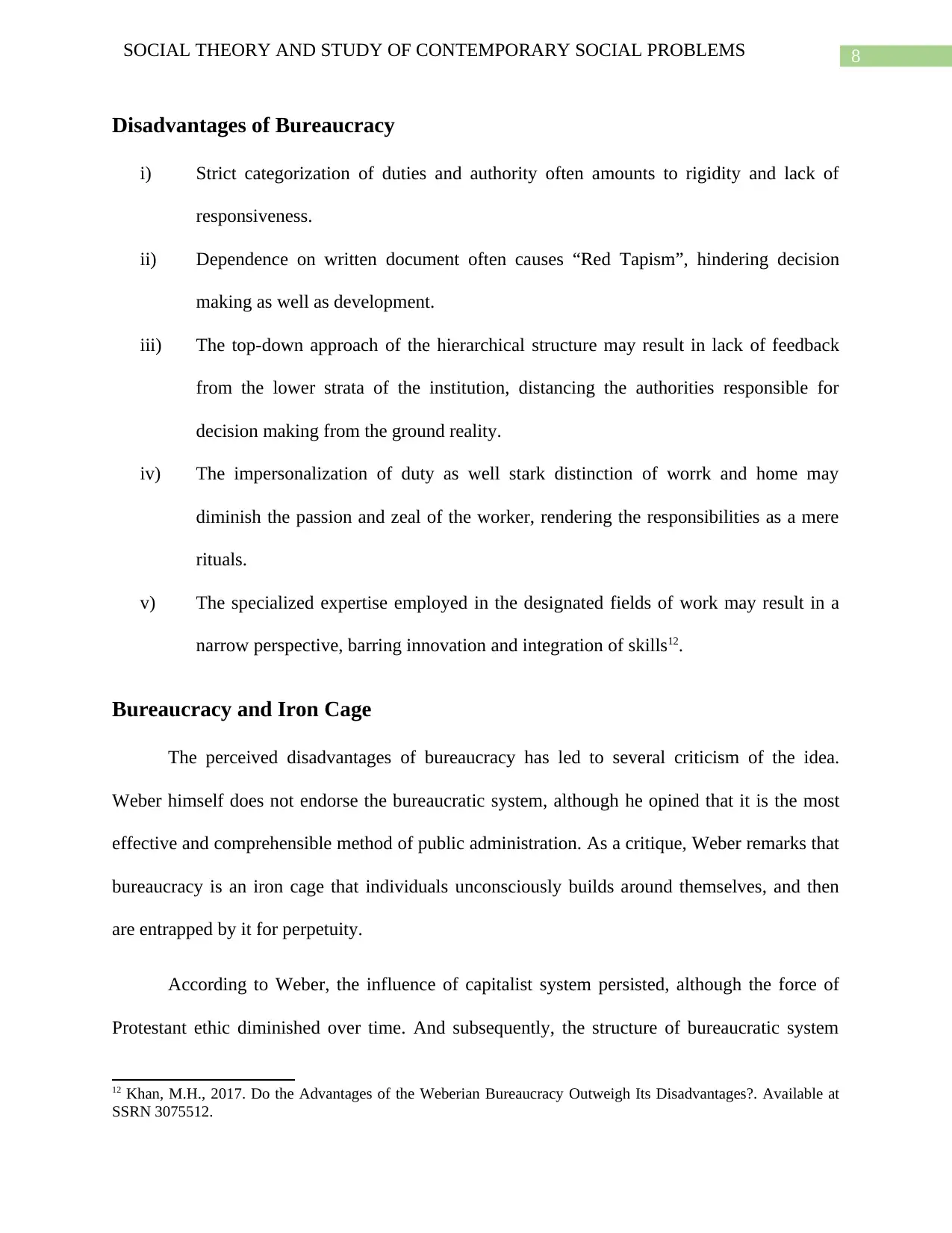
8SOCIAL THEORY AND STUDY OF CONTEMPORARY SOCIAL PROBLEMS
Disadvantages of Bureaucracy
i) Strict categorization of duties and authority often amounts to rigidity and lack of
responsiveness.
ii) Dependence on written document often causes “Red Tapism”, hindering decision
making as well as development.
iii) The top-down approach of the hierarchical structure may result in lack of feedback
from the lower strata of the institution, distancing the authorities responsible for
decision making from the ground reality.
iv) The impersonalization of duty as well stark distinction of worrk and home may
diminish the passion and zeal of the worker, rendering the responsibilities as a mere
rituals.
v) The specialized expertise employed in the designated fields of work may result in a
narrow perspective, barring innovation and integration of skills12.
Bureaucracy and Iron Cage
The perceived disadvantages of bureaucracy has led to several criticism of the idea.
Weber himself does not endorse the bureaucratic system, although he opined that it is the most
effective and comprehensible method of public administration. As a critique, Weber remarks that
bureaucracy is an iron cage that individuals unconsciously builds around themselves, and then
are entrapped by it for perpetuity.
According to Weber, the influence of capitalist system persisted, although the force of
Protestant ethic diminished over time. And subsequently, the structure of bureaucratic system
12 Khan, M.H., 2017. Do the Advantages of the Weberian Bureaucracy Outweigh Its Disadvantages?. Available at
SSRN 3075512.
Disadvantages of Bureaucracy
i) Strict categorization of duties and authority often amounts to rigidity and lack of
responsiveness.
ii) Dependence on written document often causes “Red Tapism”, hindering decision
making as well as development.
iii) The top-down approach of the hierarchical structure may result in lack of feedback
from the lower strata of the institution, distancing the authorities responsible for
decision making from the ground reality.
iv) The impersonalization of duty as well stark distinction of worrk and home may
diminish the passion and zeal of the worker, rendering the responsibilities as a mere
rituals.
v) The specialized expertise employed in the designated fields of work may result in a
narrow perspective, barring innovation and integration of skills12.
Bureaucracy and Iron Cage
The perceived disadvantages of bureaucracy has led to several criticism of the idea.
Weber himself does not endorse the bureaucratic system, although he opined that it is the most
effective and comprehensible method of public administration. As a critique, Weber remarks that
bureaucracy is an iron cage that individuals unconsciously builds around themselves, and then
are entrapped by it for perpetuity.
According to Weber, the influence of capitalist system persisted, although the force of
Protestant ethic diminished over time. And subsequently, the structure of bureaucratic system
12 Khan, M.H., 2017. Do the Advantages of the Weberian Bureaucracy Outweigh Its Disadvantages?. Available at
SSRN 3075512.
⊘ This is a preview!⊘
Do you want full access?
Subscribe today to unlock all pages.

Trusted by 1+ million students worldwide
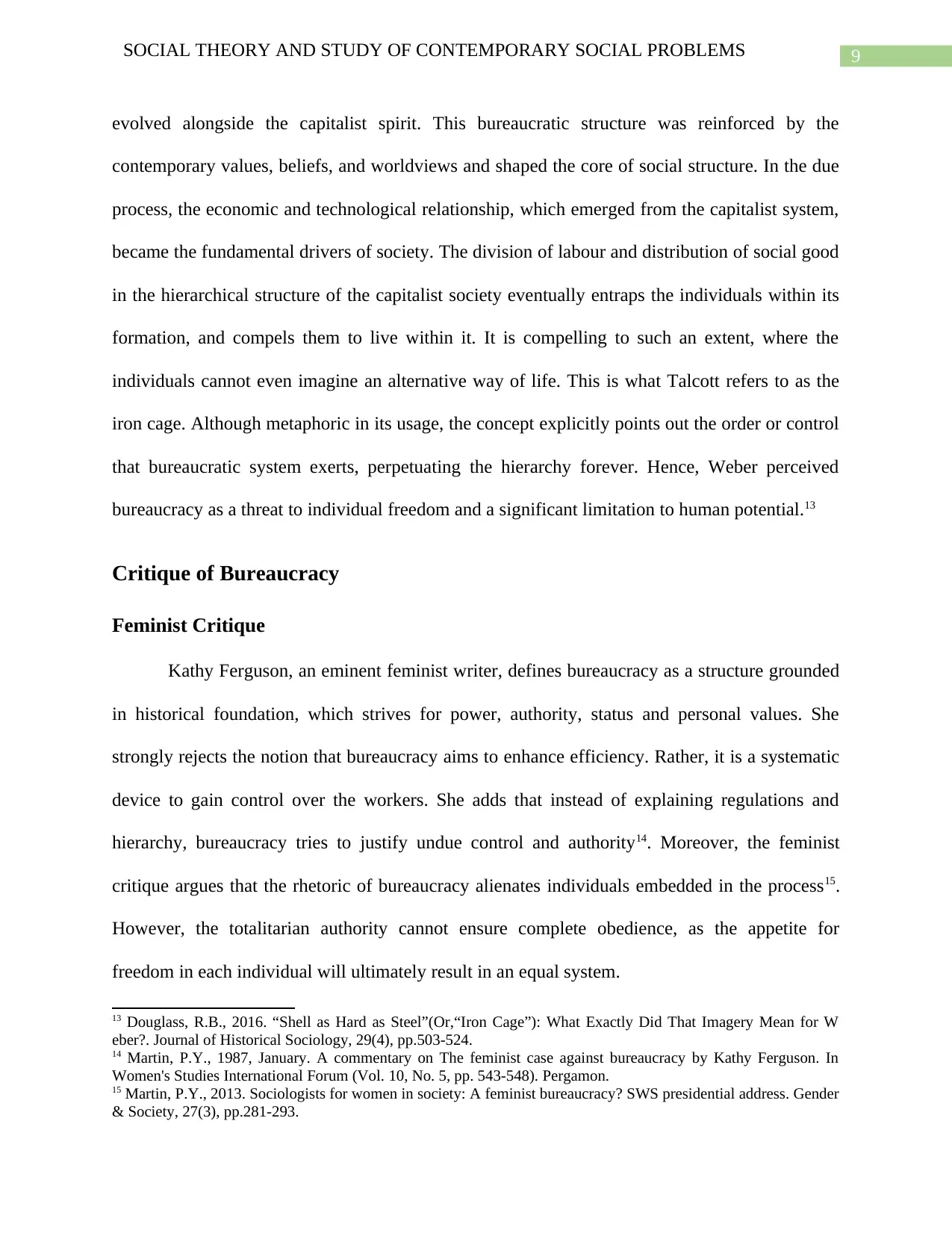
9SOCIAL THEORY AND STUDY OF CONTEMPORARY SOCIAL PROBLEMS
evolved alongside the capitalist spirit. This bureaucratic structure was reinforced by the
contemporary values, beliefs, and worldviews and shaped the core of social structure. In the due
process, the economic and technological relationship, which emerged from the capitalist system,
became the fundamental drivers of society. The division of labour and distribution of social good
in the hierarchical structure of the capitalist society eventually entraps the individuals within its
formation, and compels them to live within it. It is compelling to such an extent, where the
individuals cannot even imagine an alternative way of life. This is what Talcott refers to as the
iron cage. Although metaphoric in its usage, the concept explicitly points out the order or control
that bureaucratic system exerts, perpetuating the hierarchy forever. Hence, Weber perceived
bureaucracy as a threat to individual freedom and a significant limitation to human potential.13
Critique of Bureaucracy
Feminist Critique
Kathy Ferguson, an eminent feminist writer, defines bureaucracy as a structure grounded
in historical foundation, which strives for power, authority, status and personal values. She
strongly rejects the notion that bureaucracy aims to enhance efficiency. Rather, it is a systematic
device to gain control over the workers. She adds that instead of explaining regulations and
hierarchy, bureaucracy tries to justify undue control and authority14. Moreover, the feminist
critique argues that the rhetoric of bureaucracy alienates individuals embedded in the process15.
However, the totalitarian authority cannot ensure complete obedience, as the appetite for
freedom in each individual will ultimately result in an equal system.
13 Douglass, R.B., 2016. “Shell as Hard as Steel”(Or,“Iron Cage”): What Exactly Did That Imagery Mean for W
eber?. Journal of Historical Sociology, 29(4), pp.503-524.
14 Martin, P.Y., 1987, January. A commentary on The feminist case against bureaucracy by Kathy Ferguson. In
Women's Studies International Forum (Vol. 10, No. 5, pp. 543-548). Pergamon.
15 Martin, P.Y., 2013. Sociologists for women in society: A feminist bureaucracy? SWS presidential address. Gender
& Society, 27(3), pp.281-293.
evolved alongside the capitalist spirit. This bureaucratic structure was reinforced by the
contemporary values, beliefs, and worldviews and shaped the core of social structure. In the due
process, the economic and technological relationship, which emerged from the capitalist system,
became the fundamental drivers of society. The division of labour and distribution of social good
in the hierarchical structure of the capitalist society eventually entraps the individuals within its
formation, and compels them to live within it. It is compelling to such an extent, where the
individuals cannot even imagine an alternative way of life. This is what Talcott refers to as the
iron cage. Although metaphoric in its usage, the concept explicitly points out the order or control
that bureaucratic system exerts, perpetuating the hierarchy forever. Hence, Weber perceived
bureaucracy as a threat to individual freedom and a significant limitation to human potential.13
Critique of Bureaucracy
Feminist Critique
Kathy Ferguson, an eminent feminist writer, defines bureaucracy as a structure grounded
in historical foundation, which strives for power, authority, status and personal values. She
strongly rejects the notion that bureaucracy aims to enhance efficiency. Rather, it is a systematic
device to gain control over the workers. She adds that instead of explaining regulations and
hierarchy, bureaucracy tries to justify undue control and authority14. Moreover, the feminist
critique argues that the rhetoric of bureaucracy alienates individuals embedded in the process15.
However, the totalitarian authority cannot ensure complete obedience, as the appetite for
freedom in each individual will ultimately result in an equal system.
13 Douglass, R.B., 2016. “Shell as Hard as Steel”(Or,“Iron Cage”): What Exactly Did That Imagery Mean for W
eber?. Journal of Historical Sociology, 29(4), pp.503-524.
14 Martin, P.Y., 1987, January. A commentary on The feminist case against bureaucracy by Kathy Ferguson. In
Women's Studies International Forum (Vol. 10, No. 5, pp. 543-548). Pergamon.
15 Martin, P.Y., 2013. Sociologists for women in society: A feminist bureaucracy? SWS presidential address. Gender
& Society, 27(3), pp.281-293.
Paraphrase This Document
Need a fresh take? Get an instant paraphrase of this document with our AI Paraphraser
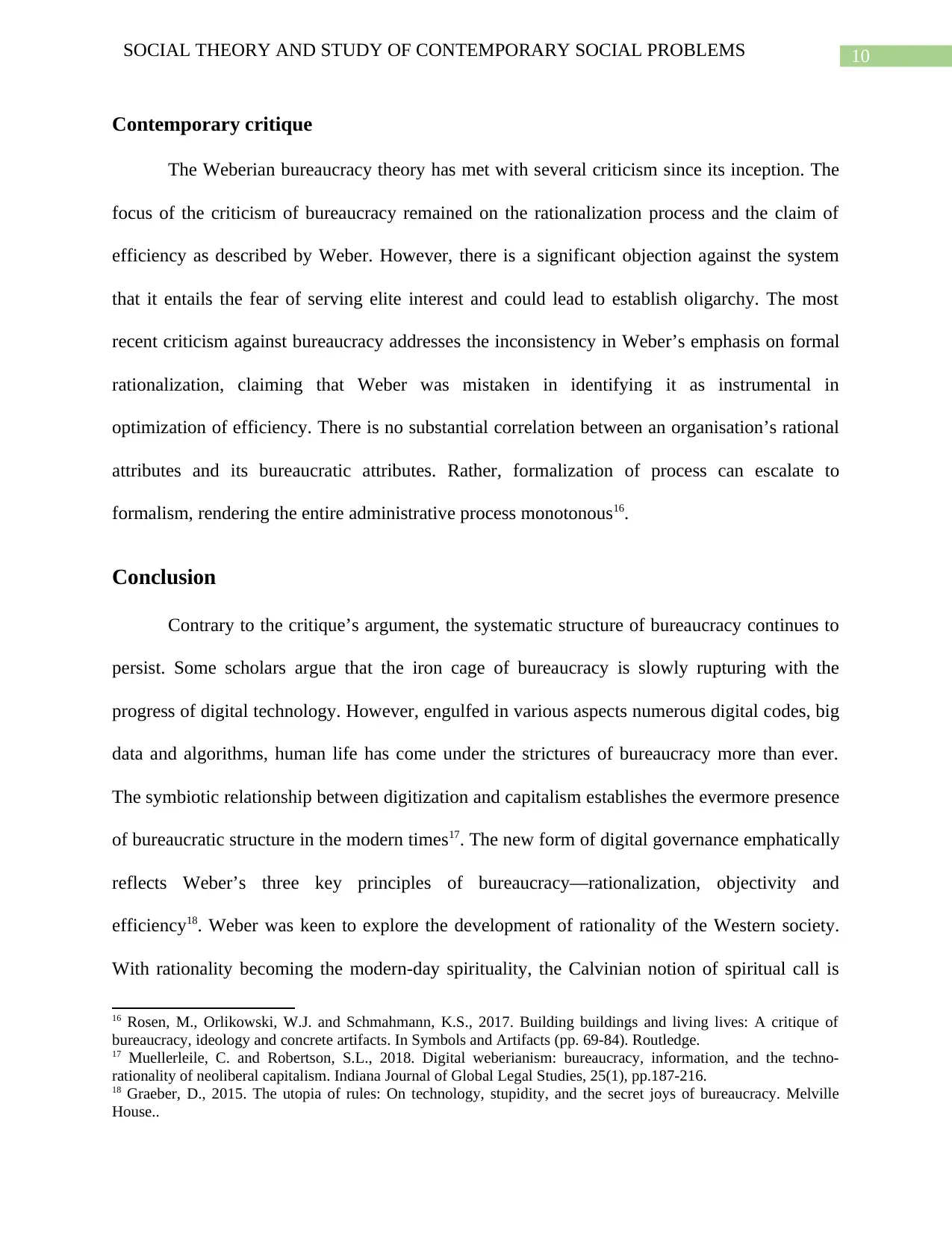
10SOCIAL THEORY AND STUDY OF CONTEMPORARY SOCIAL PROBLEMS
Contemporary critique
The Weberian bureaucracy theory has met with several criticism since its inception. The
focus of the criticism of bureaucracy remained on the rationalization process and the claim of
efficiency as described by Weber. However, there is a significant objection against the system
that it entails the fear of serving elite interest and could lead to establish oligarchy. The most
recent criticism against bureaucracy addresses the inconsistency in Weber’s emphasis on formal
rationalization, claiming that Weber was mistaken in identifying it as instrumental in
optimization of efficiency. There is no substantial correlation between an organisation’s rational
attributes and its bureaucratic attributes. Rather, formalization of process can escalate to
formalism, rendering the entire administrative process monotonous16.
Conclusion
Contrary to the critique’s argument, the systematic structure of bureaucracy continues to
persist. Some scholars argue that the iron cage of bureaucracy is slowly rupturing with the
progress of digital technology. However, engulfed in various aspects numerous digital codes, big
data and algorithms, human life has come under the strictures of bureaucracy more than ever.
The symbiotic relationship between digitization and capitalism establishes the evermore presence
of bureaucratic structure in the modern times17. The new form of digital governance emphatically
reflects Weber’s three key principles of bureaucracy—rationalization, objectivity and
efficiency18. Weber was keen to explore the development of rationality of the Western society.
With rationality becoming the modern-day spirituality, the Calvinian notion of spiritual call is
16 Rosen, M., Orlikowski, W.J. and Schmahmann, K.S., 2017. Building buildings and living lives: A critique of
bureaucracy, ideology and concrete artifacts. In Symbols and Artifacts (pp. 69-84). Routledge.
17 Muellerleile, C. and Robertson, S.L., 2018. Digital weberianism: bureaucracy, information, and the techno-
rationality of neoliberal capitalism. Indiana Journal of Global Legal Studies, 25(1), pp.187-216.
18 Graeber, D., 2015. The utopia of rules: On technology, stupidity, and the secret joys of bureaucracy. Melville
House..
Contemporary critique
The Weberian bureaucracy theory has met with several criticism since its inception. The
focus of the criticism of bureaucracy remained on the rationalization process and the claim of
efficiency as described by Weber. However, there is a significant objection against the system
that it entails the fear of serving elite interest and could lead to establish oligarchy. The most
recent criticism against bureaucracy addresses the inconsistency in Weber’s emphasis on formal
rationalization, claiming that Weber was mistaken in identifying it as instrumental in
optimization of efficiency. There is no substantial correlation between an organisation’s rational
attributes and its bureaucratic attributes. Rather, formalization of process can escalate to
formalism, rendering the entire administrative process monotonous16.
Conclusion
Contrary to the critique’s argument, the systematic structure of bureaucracy continues to
persist. Some scholars argue that the iron cage of bureaucracy is slowly rupturing with the
progress of digital technology. However, engulfed in various aspects numerous digital codes, big
data and algorithms, human life has come under the strictures of bureaucracy more than ever.
The symbiotic relationship between digitization and capitalism establishes the evermore presence
of bureaucratic structure in the modern times17. The new form of digital governance emphatically
reflects Weber’s three key principles of bureaucracy—rationalization, objectivity and
efficiency18. Weber was keen to explore the development of rationality of the Western society.
With rationality becoming the modern-day spirituality, the Calvinian notion of spiritual call is
16 Rosen, M., Orlikowski, W.J. and Schmahmann, K.S., 2017. Building buildings and living lives: A critique of
bureaucracy, ideology and concrete artifacts. In Symbols and Artifacts (pp. 69-84). Routledge.
17 Muellerleile, C. and Robertson, S.L., 2018. Digital weberianism: bureaucracy, information, and the techno-
rationality of neoliberal capitalism. Indiana Journal of Global Legal Studies, 25(1), pp.187-216.
18 Graeber, D., 2015. The utopia of rules: On technology, stupidity, and the secret joys of bureaucracy. Melville
House..
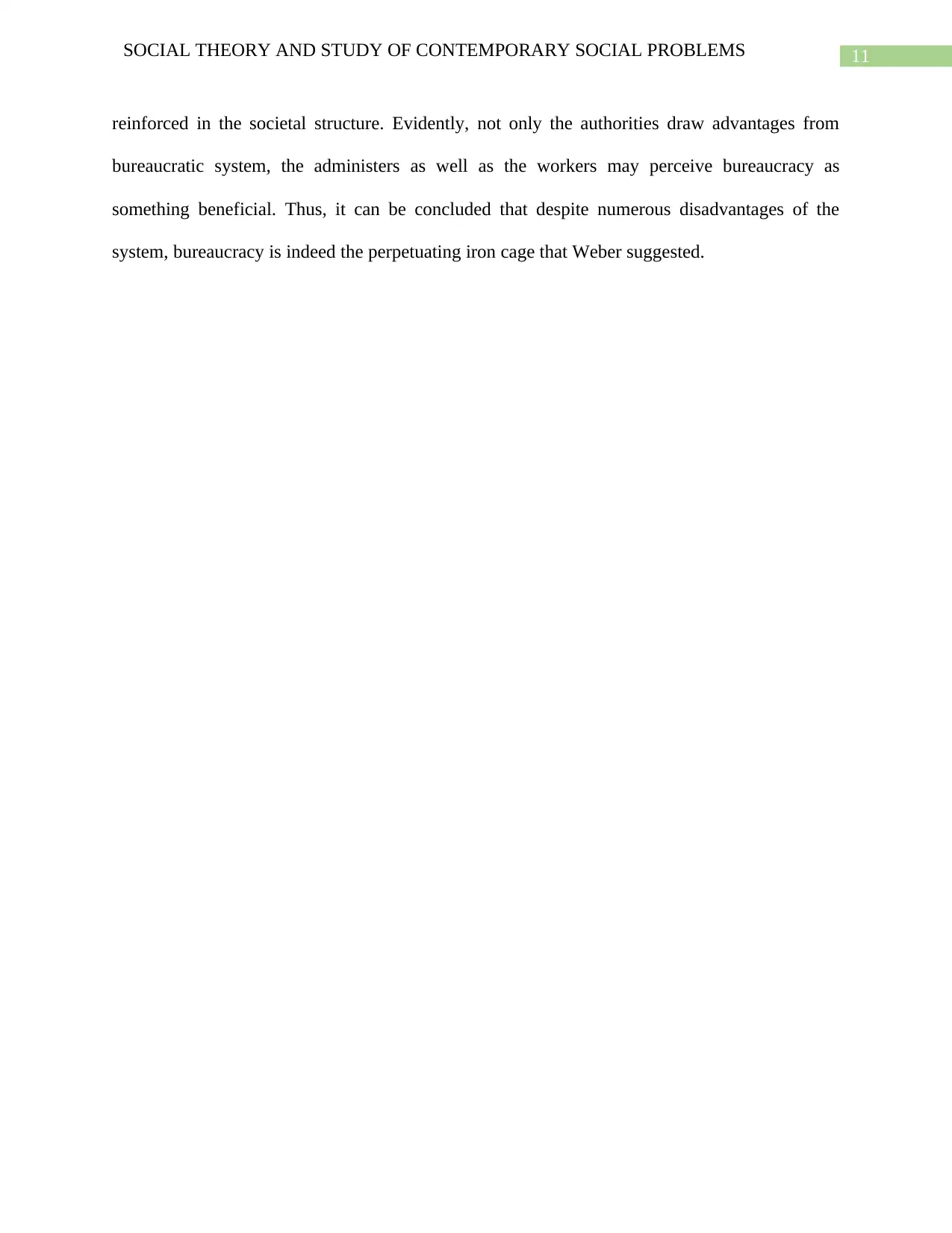
11SOCIAL THEORY AND STUDY OF CONTEMPORARY SOCIAL PROBLEMS
reinforced in the societal structure. Evidently, not only the authorities draw advantages from
bureaucratic system, the administers as well as the workers may perceive bureaucracy as
something beneficial. Thus, it can be concluded that despite numerous disadvantages of the
system, bureaucracy is indeed the perpetuating iron cage that Weber suggested.
reinforced in the societal structure. Evidently, not only the authorities draw advantages from
bureaucratic system, the administers as well as the workers may perceive bureaucracy as
something beneficial. Thus, it can be concluded that despite numerous disadvantages of the
system, bureaucracy is indeed the perpetuating iron cage that Weber suggested.
⊘ This is a preview!⊘
Do you want full access?
Subscribe today to unlock all pages.

Trusted by 1+ million students worldwide
1 out of 26
Related Documents
Your All-in-One AI-Powered Toolkit for Academic Success.
+13062052269
info@desklib.com
Available 24*7 on WhatsApp / Email
![[object Object]](/_next/static/media/star-bottom.7253800d.svg)
Unlock your academic potential
Copyright © 2020–2026 A2Z Services. All Rights Reserved. Developed and managed by ZUCOL.





